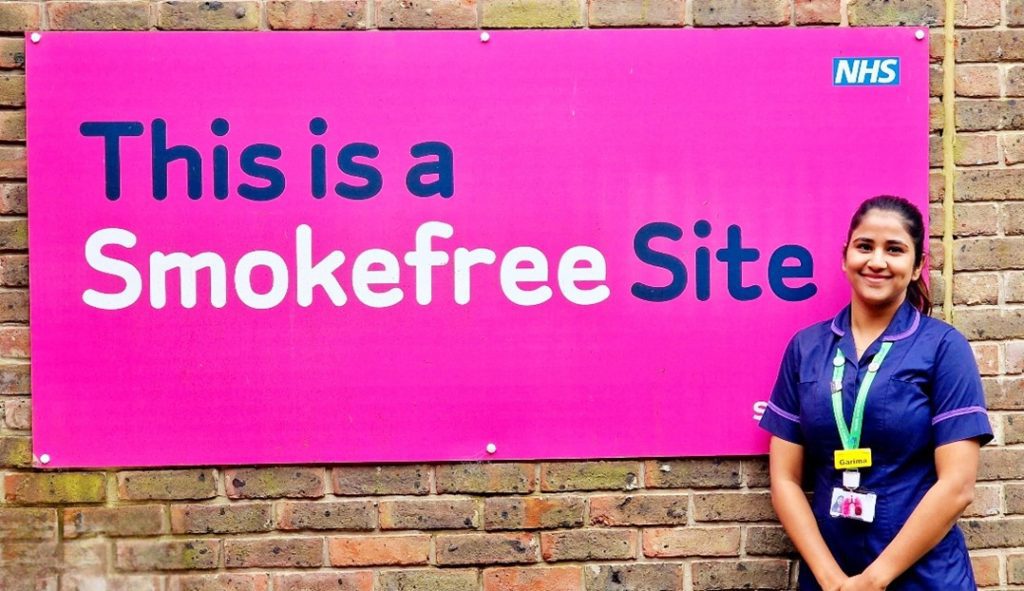Tobacco Dependency
The Dorset ‘CARED’ Smoking Cessation Project
The Dorset ‘CARED’ smoking cessation project is our new comprehensive secondary care treatment programme for tobacco addiction. It will aim to systematically identify all active smokers admitted to our hospital and immediately provide nicotine replacement therapy for the duration of their admission. This is supplemented by a consultation with one of our Tobacco Addiction Specialist Adviser who will construct a long term treatment plan after discharge. The term ‘CARED’ has been specifically chosen to ‘medicalise’ tobacco addiction and move away from the stigma of a lifestyle choice to disease treatment.
Our ambition is to achieve a fundamental shift in day-to-day practice across all inpatient settings, to incorporate screening of smoking status on admission, the provision of brief intervention and pharmacotherapies, followed by effective on-going support for smoking cessation post discharge. The emphasis will be upon achieving consistency across organisations and specialties, so that patients that smoke recognise the importance of quitting and have a clear offer of support to do so.
Meet the CARED Tobacco Addiction Team team
Hospitals provide a unique environment for people to consider the implications of their health-related behaviours and the smokefree environment means that their addiction has to be managed in some way. Healthcare staff are well positioned to screen and maximise on teachable moments with patients that smoke followed up with effective treatment and support from the specialists team.
The CARED Tobacco Addiction Team is a newly appointed team as part of the NHS Long Term Plan to help tackle tobacco dependence in our hospital patients. This specialist team consist of a Programme Manager, Tobacco Addiction Nurses, Tobacco Addiction Support Workers and a Clerical Assistant to provide a bespoke dedicated service across Dorset to;
- All people admitted to hospital who smoke, including our Community Hospitals
- All acute inpatients with mental ill health who smoke as part of specialist mental health services
- High risk outpatients including learning disability services.
Contact the team for further information on smokefree@dchft.nhs.uk
Treating Tobacco Dependency
Nurse Specialist Garima

Smoking in pregnancy service
Our aim is to support pregnant women and their significant others to quit smoking in a supportive and non-judgmental way, and provide a ‘smokefree’ start in life for their baby.
Developed in 2015, we have reduced smoking in pregnancy rates at the time of delivery by offering carbon monoxide (CO) testing for all women at the antenatal booking appointment and as appropriate throughout pregnancy, to identify smokers (or those exposed to tobacco smoke). They are then referred for support from a trained stop smoking advisor and offered behavioural support and free nicotine replacement. Significant others, who also smoke in the household, can be referred for help to quit as well.
Meet the team
Becky Fry, Public Health Midwife
Anna Kent, Smoking in Pregnancy Midwife
Emma Farmer, Smoking in Pregnancy Midwife
One million smokers in England will be given a free vaping starter kit as part of a government package of measures to get smoking rates below 5% by 2030. An estimated 9% of women smoke during pregnancy in England.
**Available until March 2025** Pregnant women and people will be offered a free vape starter kit worth £40 alongside behavioural support and one other form of NRT to aid them to quit smoking.
This is part of the government ‘swap to stop’ scheme. This offer will also be extended to any smoker living within the household so that you can ensure your baby is born to a smoke-free home.
Please contact your midwife to be referred through Badgernet or if you have already had contact with the team you can contact them directly.
Treating nicotine withdrawal
Stopping smoking is always beneficial to heath and it is never too late to quit. Every cigarette smoked damages the lungs in a way that may not show until later in life. After the age of 35-40 years, for every year of continued smoking, a person loses about 3 months of life expectancy.
Many smokers think that they will be more miserable when they stop but the evidence is that they will have better mental health and be happier once they stop smoking. Many smokers who do continue smoking, do so not by choice, but because they are dependent. (ASH2020)
Medications to help our staff and patients quit
Although nicotine in tobacco is addictive and makes you want to smoke, it is not nicotine but the other chemicals in tobacco that increase the risk of smoking-related health problems. When you stop smoking, your body still has a ‘need’ for nicotine, which creates an urge to smoke again. You may suffer withdrawal effects such as irritability, loss of concentration and sleepless nights. These effects will be reduced by using Nicotine Replacement Therapy (NRT). NRT comes in various forms: Nicotine gums, Patches, Inhalators, Tablets, Lozenges, Sprays.
How is NRT effective?
NRT does increase the chance of quitting smoking. Various studies have looked at this issue. The studies compared NRT to a similar dummy (placebo) product in people who were keen to stop smoking. The results from the studies showed that, on average, about 17 in 100 people who took NRT stopped smoking successfully. This compared with about 10 in 100 who took the dummy product rather than NRT. In other words, it increased the rate of success by about 70%. A combination of NRT with support or counselling may give the best chance of success.
LiveWell Dorset
If you live in Dorset and want to quit smoking, but are not sure where to start, register or talk to LiveWell Dorset today.
Their team of advisors and coaches are ready to discuss your stop-smoke options. They have helped people to stop smoking across the whole of Dorset.
Click here to visit the LiveWell Dorset website.
Patient Information Leaflets
Click here to access the Tobacco Dependency Patient Information Leaflets.
